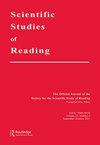连贯性标准语境下的屏幕阅读与走神研究
IF 2.4
2区 教育学
Q1 EDUCATION & EDUCATIONAL RESEARCH
引用次数: 1
摘要
摘要目的本研究的目的是检验阅读目的(学习或娱乐)是否会改变阅读媒介对理解和理解准确性的影响。第二个目的是研究走神与阅读媒介和阅读目的之间的关系。一个意想不到的目的是研究新冠肺炎紧急远程教学在阅读理解、走神以及屏幕和纸张的偏好和使用方面的作用。方法在本研究中,将133名本科生随机分配到学习或娱乐的阅读目的,以及从纸上(从书上)或屏幕上(从iPad上)阅读。结果无论是阅读媒介还是阅读目的,在文本理解评估、元理解或走神方面都没有可靠的差异。阅读自己喜欢的媒介似乎与更准确的元理解有关。探索性分析表明,在新冠肺炎学习发生变化后,在屏幕上阅读时,纸上学习减少,与任务相关的想法增加。结论当读者有阅读目的并且阅读的触觉体验在不同媒介之间相似时,阅读媒介对理解的影响可能较小。媒介对元理解和走神的影响可能因读者的特点而异。本文章由计算机程序翻译,如有差异,请以英文原文为准。
Investigating Reading from Screens and Mind Wandering in the Context of Standards of Coherence
ABSTRACT Purpose The purpose of this study was to examine if reading purpose (study or entertainment) varied the effect of reading medium on comprehension and accuracy of perceptions of comprehension. A secondary purpose was to examine how mind wandering relates to reading medium and reading purpose. An unanticipated purpose was examining the role of emergency remote COVID-19 instruction on reading comprehension, mind wandering, as well as both preference for and use of screens and paper. Methods In this study, undergraduate students (N = 133) were randomly assigned to reading purposes of study or entertainment as well as reading from paper (from a book) or screens (from an iPad). Results Neither reading medium nor purpose had reliable differences in performance on the text comprehension assessment, metacomprehension, or mind wandering. Reading from one’s preferred medium appeared to be related to more accurate metacomprehension. Exploratory analyses indicated less studying from paper and more task-unrelated thoughts while reading from screens after the COVID-19 learning changes. Conclusions Reading medium may possibly have less effect on comprehension when readers have purposes for reading and the haptic experience of reading is similar by medium. Medium effects on metacomprehension and mind wandering may vary depending on characteristics of the reader.
求助全文
通过发布文献求助,成功后即可免费获取论文全文。
去求助
来源期刊

Scientific Studies of Reading
Multiple-
CiteScore
7.20
自引率
2.70%
发文量
26
期刊介绍:
This journal publishes original empirical investigations dealing with all aspects of reading and its related areas, and, occasionally, scholarly reviews of the literature, papers focused on theory development, and discussions of social policy issues. Papers range from very basic studies to those whose main thrust is toward educational practice. The journal also includes work on "all aspects of reading and its related areas," a phrase that is sufficiently general to encompass issues related to word recognition, comprehension, writing, intervention, and assessment involving very young children and/or adults.
 求助内容:
求助内容: 应助结果提醒方式:
应助结果提醒方式:


